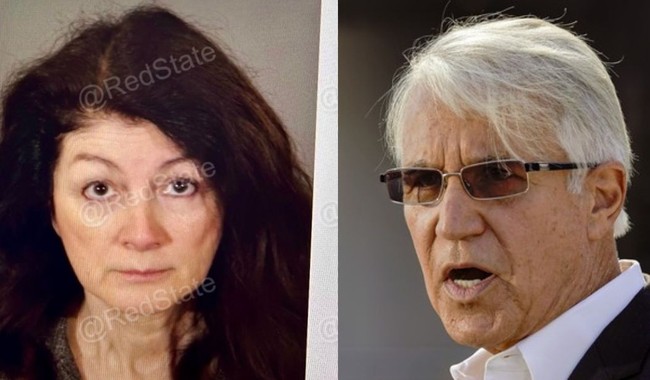
On Tuesday Diana Teran, a top lieutenant for Los Angeles District Attorney George Gascon, was ordered to stand trial on six felony charges that she improperly accessed and used Sheriff Department records.
That this case, with the immense political pressure surrounding it, even got to this stage is notable. Gascon challenger Nathan Hochman immediately highlighted that Gascon is still paying Teran as she faces felony charges arising within the scope of her employment, asking on X, “When will the madness end?”
After several days of testimony, a Superior Court judge today ordered DA George Gascon’s No. 3 in command, Diana Teran, to stand trial on six FELONY charges for repeated and unauthorized use of data from statutorily protected peace office personnel files. Gascon has continued to… https://t.co/rNd7n5eIb0
— Nathan Hochman (@NathanHochmanDA) August 20, 2024
It is fair for Hochman to raise these questions. It may be less wise of him to later call the decision “well-reasoned.”
Judge Ohta’s well-reasoned decision makes it clear why he ordered Gascon’s No 3 in command Diana Teran to stand trial on six felony charges. It is unprecedented for a top LA DA executive to be accused of corruption like this. Yet Gascon still is paying her over $320,000 annual… https://t.co/NAMyODBC73
— Nathan Hochman (@NathanHochmanDA) August 21, 2024
Notably, Hochman avoided commenting on the strength of the case itself. That is because, after yesterday, the Attorney General has a more difficult job than it did before proving this case.
Not because evidence was weak on what Ms. Teran did. She still, seemingly undisputably, used her access to Sheriff Department records as the source for her attempted buildup of George Gascon’s “registry of disreputable law enforcement officers” (Gascon’s campaign website’s words, not mine). This little trick was discovered not by Gascon’s political enemies, but after Gascon’s other chief lieutenant’s attempted to use the registry as a threat while he was being arrested for disorderly conduct.
RELATED: A Massive Scandal Is Brewing in Los Angeles After DA George Gascon’s Number 3 Is Charged With 11 Felonies
This case will be harder to prove because the judge hearing the case, Judge Sam Ohta, made the case harder to prove with his exceedingly narrow interpretation of what it means to “access” and “use” records under Penal Code section 502(c)(2).
As Judge Ohta himself acknowledges in his 28-page opinion, “we are in uncharted territory” with this prosecution. However, the language of the law, as laws go, is relatively clear. It seeks to protect an organization’s data from theft of any kind. The government must prove “a person knowingly accessed a computer, computer system, or computer network” and “that person, without permission, knowingly […] made use of any data from a computer, computer system, or computer network.”
Nowhere does it say the data must have special legal protections. It can be any data, even publicly available data, so long as the owner of the computer did not give permission for the data’s use. But Judge Ohta still found that the case “turns on whether the Defendant breached the confidentiality of [police] personnel records.”
Even worse for the Attorney General, Judge Ohta required the prosecution to prove that Ms. Teran “accessed” not just any Sheriff’s Department computer system, but a specific computer system that related to confidential personnel records.
Such a reading is not supported by the statute, which clearly broadly encompasses any computer that is not the Defendant’s. To defend this, Judge Ohta cited a case that points out that one of the legislative purposes of the statute is to prevent hacking. While this is undoubtedly true, it does not change what even those cases acknowledge: that preventing hacking is one of the purposes of the statute. Non-permitted use of a prior employer’s data, at a future employer who is likely to have a politically adversarial and litigious relationship with the former employer, would be another. Whether that data came to her via hacking or a work email is not a distinction the law makes.
Going forward, this means the Attorney General has a tougher hill to climb then they likely expected at the outset of the case. Judge Ohta’s findings in this legal “uncharted territory” are not binding on the next judge. In fact, the prosecution is even allowed to file the two charges Judge Ohta dismissed right back on the charging document if they want another judge to take a look at it.
But Judge Ohta is a former supervising judge of the criminal courts, and his word, written in a 28-page opinion, will likely carry some weight going forward, right or not. Very few preliminary hearings in Los Angeles – well less than 1 percent – result in written rulings. That Judge Ohta (appropriately) took the case quite seriously only makes it less likely a future judge will reject his findings in future hearings.
The Prosecutors Alliance, a Gascon-friendly nonprofit, immediately saw the silver lining in this ruling, saying they “expect” an acquittal at trial in a case they see as “unraveling.”
With each step of the legal process, the case against Diana Teran is unraveling. Read our statement from Executive Director Cristine Soto DeBerry after two more charges against ADA Teran were dropped today: pic.twitter.com/lWw3fJbMEb
— Prosecutors Alliance (@prosalliance) August 20, 2024
If whoever turns out to be the trial judge requires the Attorney General to prove the same things Judge Ohta required, the chances of conviction in this case are severely diminished. Mr. Hochman’s decision to call Judge Ohta’s decision “well-reasoned” may turn out to be short-sighted.